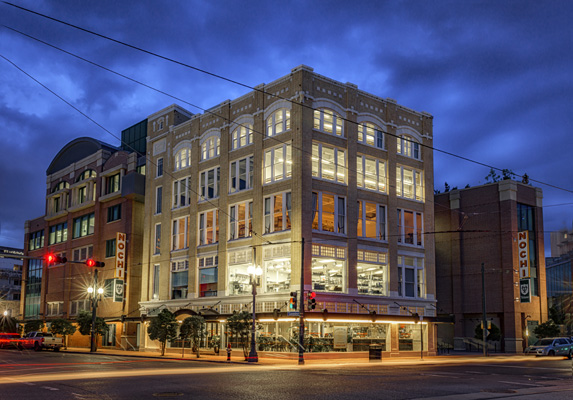
On Oct. 19, 1914, Tulane University’s newly established College of Commerce and Business Administration opened its doors to students for the very first time.
Those doors weren’t located on Tulane’s uptown campus, however. They were on Camp Street in downtown New Orleans at the offices of the Association of Commerce, a precursor to the Chamber of Commerce. That site was chosen for a good reason: The college’s first students weren’t traditional undergraduates but rather working professionals, many of whom had businesses located nearby.
Now, more than 100 years after establishing a footprint in downtown New Orleans, Tulane University’s business school is back.
On Jan. 3, 2019, the A. B. Freeman School of Business officially opened the Stewart Center CBD, the school’s long anticipated expansion into downtown New Orleans. Occupying a quarter of the five-story New Orleans Culinary & Hospitality Institute (NOCHI), the 21,000-square-foot space at the corner of Carondelet Street and Howard Avenue houses the Stewart Center for Executive Education, which administers degree programs including the executive MBA and a newly launched non-degree executive education initiative, and the Goldring Institute for International Business, which oversees nearly a dozen degree programs for international students. The Stewart Center CBD also hosts select graduate courses, including serving as the home of the Freeman School’s new entrepreneurial hospitality program, which offers students the option of earning either a concentration or a specialization focusing on the development of new products, services and businesses with a hospitality focus.
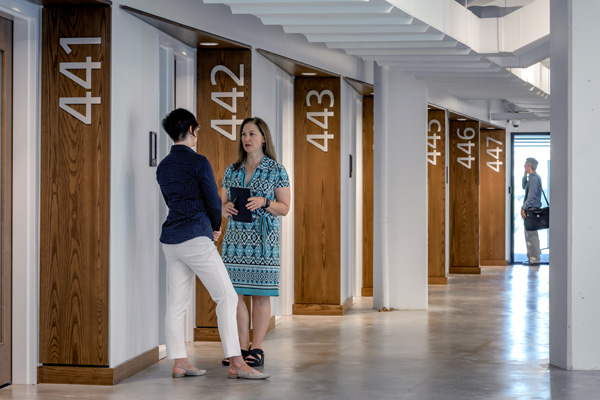
Carol Spansel, right, associate director of operations for the executive MBA program, talks with Amberly Page, executive secretary for executive programs, at the Stewart Center CBD. Behind them is a row of hoteling offices for use by faculty teaching at the center.
“The Stewart Center CBD is a manifestation of part of our strategy, and that strategy is to re-double our focus here in New Orleans,” says Freeman School Dean Ira Solomon. “Like other aspects of our strategy, we’re trying to play to extant strengths and strengths that we think we have a comparative advantage to develop. Stewart Center CBD positions us to pursue a multitude of new initiatives that leverage those strengths.”
Designed by Eskew+Dumez+Ripple architects, the Stewart Center CBD houses four state-of-the-art classrooms — including two tiered classrooms and two flat classrooms — with a combined seating capacity of more than 200 students. It features 18 breakout spaces, two conference rooms, faculty and administrative offices — including six “hoteling” offices for visiting professors — and large student lounge and reception areas. With Tulane ID-controlled entry, the facility has excellent security features and is accessible to faculty and students after hours and on weekends.

Clockwise from left, EMBA students Patricia McCarty, Micah Schilling, John Mouton and Chung Hui work on a project in one of Stewart Center CBD’s open work spaces.
While establishing a physical presence at a premier central business district location is the main attraction, co-locating within the New Orleans Culinary & Hospitality Institute — the culinary school launched in 2013 by members of the Brennan family — offers its own advantages. In addition to its own facilities, the Freeman School has access to a number of NOCHI-run spaces, including the Dining Lab, a 70-seat cafe that serves as the executive MBA dining room; McIlhenny Hall, a large meeting space and banquet room; and the Founders’ Terrace and Tabasco Terrace, two lush open-air balconies for receptions and special events that offer spectacular views of downtown New Orleans.
The Freeman School’s connection with NOCHI goes beyond the physical space. In 2013, Ti Martin (MBA ’84), co-proprietor of the Commander’s Palace family of restaurants and chair of NOCHI’s governing board, reached out to the Freeman School for financial modeling assistance when NOCHI was putting together its proposal to take over the property, which was then known as the Louisiana ArtWorks Building.
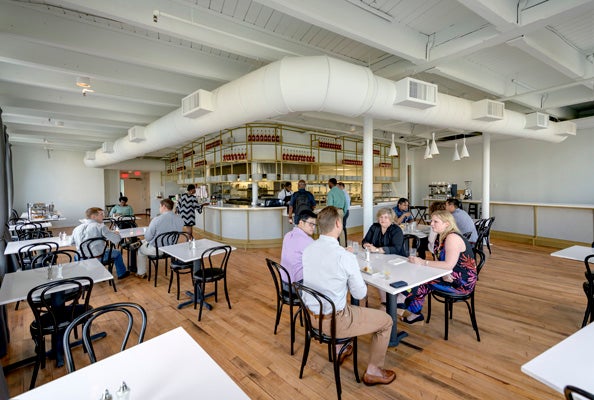
EMBA students enjoy breakfast in the Dining Lab, a cafe space operated by NOCHI that serves as the executive MBA dining room.
Originally built in 1915 for the H. B. Bradford Furniture Co., the Arts and Crafts-style structure had housed a furniture store and warehouse and later became headquarters of the Housing Authority of New Orleans. In 1998, the Arts Council of New Orleans acquired the property with the intention of transforming it into a sprawling arts complex filled with studios and galleries, but the project ran into financial difficulty and was finally abandoned in 2010.
Since the Arts Council had used tax money to renovate the building, the board overseeing the sale of the property sought redevelopment proposals that would serve the public good. In a city with 88,000 hospitality jobs, NOCHI’s plan for a state-of-the-art school to train culinary and hospitality workers fit the bill perfectly.
The proposal also aligned with a project on which the Freeman School had been independently working. With the support of a $1 million gift from Business School Council Chair Jerry Greenbaum (BBA ’62), the Freeman School was in the early stages of developing a new program focusing on the intersection of entrepreneurship and hospitality.
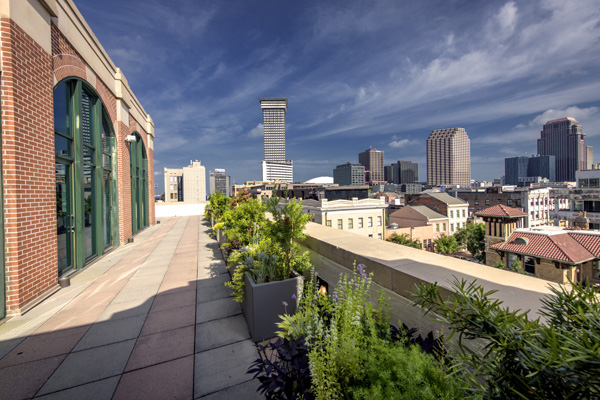
The Founders’ Terrace, a reception and event space on the fifth floor of the New Orleans Culinary & Hospitality Institute, offers dazzling views of downtown New Orleans.

The fourth-floor main office of the Stewart Center CBD houses the dean’s downtown office and administrative offices for executive education and the EMBA program.
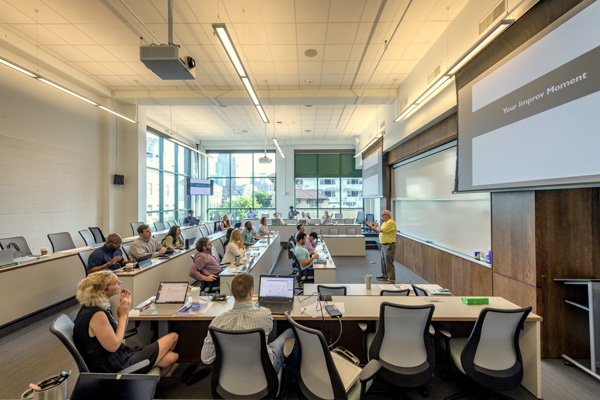
Tim West, professor of practice in accounting, teaches a class in one of the Stewart Center CBD’s multi-tiered classrooms.
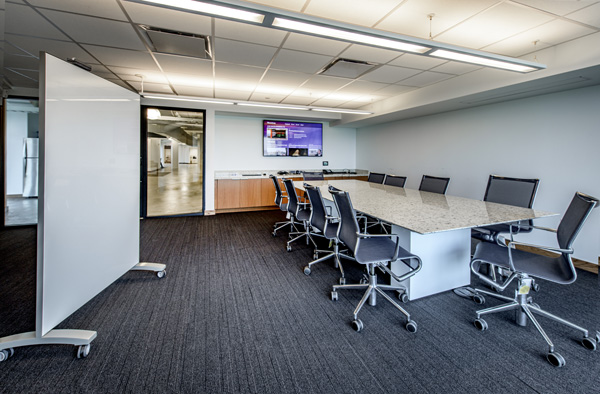
The Stewart Center CBD’s fourth-floor conference room.
When the possibility of leasing space in the building became available, Solomon immediately recognized the opportunity.
“As we developed the entrepreneurial hospitality idea more fully, we realized there could be significant synergies in the NOCHI facility that we could leverage to help the entrepreneurial hospitality initiative,” Solomon says.
“Hospitality is the second largest employer in the U.S. and a major driver of the New Orleans economy,” says Martin. “We are excited about the potential for partnering with the Freeman School to create new educational offerings that leverage the city’s hospitality sector and hospitality-related organizations.”
While the Entrepreneurial Hospitality initiative was one of the factors that attracted the Freeman School to NOCHI, establishing a physical presence in downtown New Orleans is part of a bigger strategy.
“We needed to be in the CBD for several reasons,” nurturing the further development of the entrepreneurial ecosystem, which is a big part of the future of New Orleans.”
In the wake of Hurricane Katrina, Tulane University boldly recommitted itself to New Orleans and embraced the university’s role as an engine and a facilitator of economic development. When the Freeman School completed its strategic plan in 2013, a key component was aligning existing Freeman School strengths with city and regional strengths, a strategy designed both to spur economic growth and foster the development of new programs with the potential for national recognition. With the oil and gas business in a long decline, Solomon says entrepreneurship has emerged as perhaps the city’s strongest driver of economic activity. Establishing a physical presence in the heart of the city’s startup-heavy “innovation corridor” puts Freeman in the center of this emerging economy. The Stewart Center CBD facilitates deep connections with the business community, provides greater educational access to working professionals in the CBD, and leverages the city of New Orleans as a vital learning laboratory for students across all programs.

Freeman School Dean Ira Solomon, photographed overlooking the NOCHI building’s Goldring and Woldenberg Family Foundation Lobby. Solomon says the opening of the Stewart Center CBD is part of a strategy to re-focus the Freeman School’s efforts on New Orleans.
While the opening of the Stewart Center CBD in many ways marks the start of a new era for the Freeman School, Solomon is quick to point out that in many ways it marks a return. Not only did Freeman get its start in downtown New Orleans, but the Freeman School has always enjoyed a close relationship with the city’s business community. The school was founded in 1914 through the support of more than 200 prominent business leaders, companies and organizations who believed that state-of-the-art business education was essential if the city was to remain competitive. The opening of the Stewart Center CBD reaffirms that commitment to serving the needs of the city’s business community and puts Freeman in the right place at the right time to implement a host of new initiatives.
“The Stewart Center CBD is going to enable us to transform the programs we offer, the experiences we provide and the markets we serve,” Solomon says. “There’s no place we’d rather be right now than downtown.”
